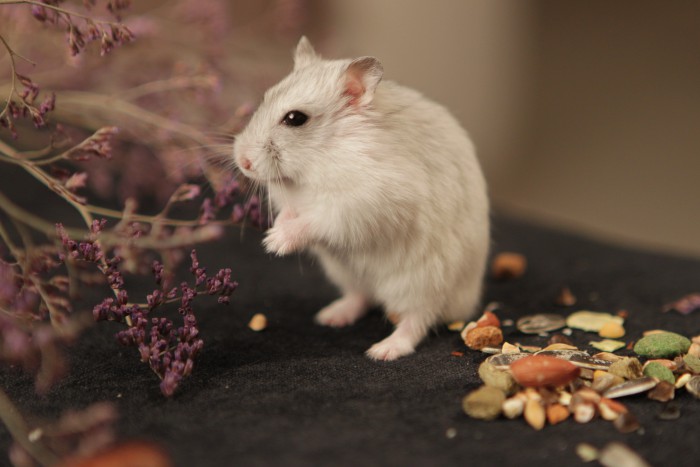FEEDING YOUR HAMSTER

You may buy your hamster food from a pet shop which sells pressed pellets. Hamsters seem to enjoy all types of vegetables but be careful not to give too much of these, as hamsters come from a habitat from little water (semi-desert) and a high quantity of vegetables can cause diarrhoea.
In the wild, hamsters eat seeds, grasses, leaves and insects. In captivity, hamsters should be fed a good diet with lots of varieties like seeds, grains, fruits and vegetables – fruits and vegetables should be fed moderately and not excessively. Fruits and vegetables should always be washed with clean water before feeding them to hamsters. Good vegetables for hamsters are: a small piece of lettuce, chicory, endive, cauliflower, paprika, cucumber and broccoli. Good fruits for hamsters are: a small piece of apple, pear, peach, melon, berries and banana.
Make sure you remove any uneaten fruits, since they will start to rot and rotten fruits will make your hamster ill.
Hamsters like a large selection of pelleted hamster diets which are available at all pet shops. Giving your hamster the correct food is important, since it affects the hamster’s health, life span and reproduction.
NB: Do not feed your hamster lots of sunflower seeds. Also, make sure that your hamster does not only eat the sunflower seeds from the hamster food mix, since if your hamster only eats the sunflower seeds, the hamster will not get the correct amount of calcium needed.
Always make sure that you provide fresh water for your hamster daily. It's best to give water in a drinking bottle as a dish of water could be easily overturned or filled with shavings or other dirt. The water in the water bottle should be bottled water. Never give your hamster tap water. Hamster drinking bottles should be cleaned at least once a week by watering the bottle and using a cotton bud to clean the gab between the bottle and the opening.
VITAMINS AND MINERALS
If you are giving your hamster a good and balanced diet, it is unnecessary to give the hamster vitamins, minerals and salt blocks. Some hamster owners give their hamsters a "mineral lick". The hamster takes in minerals by licking the stone and it seems that mostly pregnant female hamsters like them. By gnawing on the "mineral licks", the hamsters get extra calcium and at the same time keep their teeth sharp.
Hamsters don't need any foods that contain Vitamin C, since they produce this type of vitamin themselves.
HAMSTER TREATS
You may find various treats in pet stores and most hamsters love these. Treats should only be fed to the hamster as an occasional supplement to the hamster's diet. Some treats bought from pet stores are designed to hang from the top of the cage. These treats provide stimulation as well as food to the hamster. Homemade treats can be fed to your hamster - like bread, scrambled egg, boiled egg, rice crackers and mealworms. Mealworms are usually found at pet stores that sell exotic pets.
HARMFUL FOODS
Avoid giving you hamster sharp, dry, stiff or sticky food (such as candy) since these will get stuck in the hamster’s cheek pouches and injure the delicate tissue of the hamster’s mouth. These foods should be completely avoided. Chocolate is poisonous to hamsters and junk food should not be given since they are not nutritious to the hamster’s health.
It seems like it should go without saying, but never, ever give your hamster alcohol. Some thoughtless people may find it funny to see a hamster stumbling around and acting drunk, but even a couple milliliters of alcohol can prove fatal to your pet. Not only are hamsters tiny, making it very easy for them to ingest a fatal amount of alcohol, but their bodies are also simply unable to process beer or liquor.
Did you know that almost all rodents eat their own droppings? This is normal because the hamster's faeces, provide the hamster with the bacteria needed in creating Vitamin B12 during digestion.
Click here to read further more about what is good and what is bad for your hamster's diet.
Click here to read and view the plants that are poisonious to hamsters and thus the plants listed should never be given to them.
photo credit

